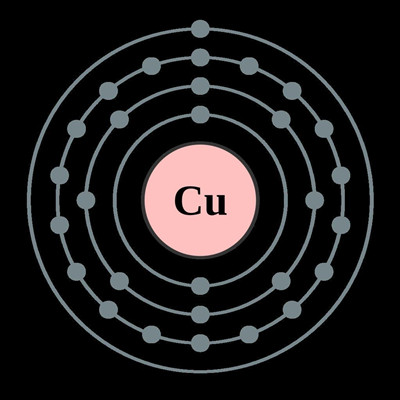財(cái)經(jīng)商業(yè)
Copper
銅
Broken contacts
破碎的聯(lián)系
Finance, not economics, may explain copper's recent plunge
金融市場而非經(jīng)濟(jì)狀況造成了近期的銅價(jià)下滑
THE copper price has long been held to signal the state of the global economy as reliably as the metal conducts electrons.
銅價(jià)一直以來都是全球經(jīng)濟(jì)形勢的信號,它的這個(gè)作用正如導(dǎo)電性能一樣可靠。
But that reputation—never fully deserved—is now in tatters. Copper's plunging price says a lot about China, but little about the rest of the world.
如今這個(gè)本就不甚牢固的地位已經(jīng)岌岌可危。一路下滑的銅價(jià)折射出中國的許多問題,不過與世界形勢則關(guān)系不大。
China consumes about 40% of global copper production.
中國消耗著全球40%的成品銅。

But not all of that goes straight into manufacturing or construction.
但并非所有的銅都被立即用于制造業(yè)以及建筑業(yè)。
Chinese companies have also been using copper as collateral for their hard-currency loans: “buy, store, hedge and pledge” in the words of one trader.
中國的公司還將銅作為硬通貨貸款的抵押品。用一位從業(yè)者的話說,就是“購買,儲存,用來對沖和抵押”。
That has led to an overhang, with far more of the metal stockpiled than users need.
銅的庫存量已經(jīng)遠(yuǎn)遠(yuǎn)超過使用需求,已經(jīng)造成了過量儲存。
Any change in the conditions that created this stockpile can have a big effect on the price.
造成這種儲存的各種因素稍有變化就會對銅價(jià)造成重大影響。
A sign of this is that when the Chinese economy slows, as seems to be happening now, with manufacturing activity weakening for a fifth consecutive month, those stockpiles rise.
其中一個(gè)例子就是當(dāng)中國經(jīng)濟(jì)增速放緩時(shí),庫存就會增加。
CRU, a metals researcher, now says the copper-market surplus this year will be four times bigger than it previously estimated, with forecast production outpacing demand by 140,000 tonnes.
金屬研究機(jī)構(gòu)CRU最近表示今年的銅剩余量將是其之前預(yù)計(jì)的4倍,預(yù)計(jì)產(chǎn)量將超過需求量140,000噸,。
Chinese data are notoriously opaque, so judging the real health of the country's copper-consuming industries is hard.
鑒于中方的數(shù)據(jù)是出了名的不透明,所以很難判斷該國銅消耗產(chǎn)業(yè)的真實(shí)規(guī)模。
A rebound in growth later this year could revive demand for the metal.
今年隨后的經(jīng)濟(jì)增長反彈或許能重新刺激銅材的需求。
But other factors are piling pressure on to the copper price.
但其他因素也在給銅價(jià)施壓。
One is a growing wariness among creditors, following a corporate-bond failure this month.
其中之一就是于本月發(fā)生了中國國內(nèi)20世紀(jì)90年代以來首次的企業(yè)債券違約,這使借債機(jī)構(gòu)變得愈發(fā)謹(jǐn)慎了。
As banks worry about their customers' abilities to service debts, Chinese firms are finding it harder to get loans.
由于銀行擔(dān)心客戶的償還能力,中國公司發(fā)現(xiàn)貸款更難了。
This is making some sell their copper to raise cash.
這使不少公司拋售儲存的銅來套現(xiàn)。
Another factor is that Chinese regulators are cracking down on companies using copper stockpiles for speculation.
還有一個(gè)因素是中方的監(jiān)管機(jī)構(gòu)正在打擊公司們利用銅存儲進(jìn)行投機(jī)活動的行為。
Joel Crane of Morgan Stanley, an investment bank, argues that the authorities are targeting the “shadow-banking network” used by companies to evade controls on hard-currency lending.
投行摩根斯坦利的Joel Crane評論說,政府已經(jīng)盯上了公司們用來逃避硬通貨借貸管制的“影子銀行網(wǎng)絡(luò)”。
Chinese importers have long used letters of credit issued by banks for raw-material imports as a way of raising funds which they then use for other purposes.
中國的銀行會發(fā)行原材料出口的信用證來募集資金,而進(jìn)口商們卻長期把這些信用證用于其它目的。
Such shadow banking created lucrative arbitrage possibilities for those able to take advantage of the difference between local and international interest rates.
這樣的影子銀行系統(tǒng)為那些能利用國內(nèi)外利率差的人提供了通過套利牟取暴利的機(jī)會。
This is a useful dodge when times are good, not so when scrutiny increases.
當(dāng)時(shí)機(jī)合適時(shí),這是很有用的逃避方式,可監(jiān)管嚴(yán)格時(shí)就不是了。
A reform in mid-2013 made companies holding copper for collateral keep it onshore, rather than in bonded warehouses, raising the cost of storage.
2013年中的一次改革要求持有銅作為抵押品的公司將銅保存在大陸地區(qū),而非保稅倉庫,這也增加了儲存的成本。
A similar story seems to be unfolding with iron ore.
鐵礦石也在發(fā)生類似情況。
China accounts for half of world steel production, so the iron-ore price is hypersensitive to any downward flicker in demand.
中國占到了世界鋼材產(chǎn)量的一半,所以鐵礦石價(jià)格對于一絲一毫的需求減少的苗頭都極度敏感。
Iron-ore stocks at Chinese ports are at record highs.
中國碼頭上的鐵礦石儲存量達(dá)到了創(chuàng)紀(jì)錄的數(shù)值。
China is also trying to substitute its own, lower-quality ore for the higher-grade imported stuff.
中國正在試圖用進(jìn)口的高純度礦石替代低質(zhì)量的本國礦石。
It wants to cut overcapacity and pollution, including using the financial markets to put pressure on the steel industry through higher interest rates and tighter credit.
政府想要采取措施對付產(chǎn)能過剩和環(huán)境污染問題,包括在金融市場利用高利率和信貸緊縮來給鋼鐵行業(yè)施壓。
Companies who used iron ore as collateral for their borrowing may now have to use it for debt repayments instead.
將鐵礦石用作貸款抵押品的公司如今或許要將其轉(zhuǎn)用作貸款償還了。
Copper bears fear that this could easily get out of hand.
銅金屬持有者擔(dān)心這會造成情況失控。
But the likelihood is more a slow unwinding of positions than a crash.
但哪怕要失控,也將是一個(gè)緩慢的頭寸解除過程而不會突然全部拋售。
Goldman Sachs, another bank, notes that it is not in the Chinese authorities' interest to shut down commodity-financing deals altogether.
另一家銀行高盛集團(tuán)表示中國政府并不打算完全廢除商品金融。
It makes more sense just to increase the hedging and storage costs of those firms using commodities to speculate.
更像是只讓使用商品進(jìn)行投機(jī)的公司對沖和儲存的成本上升。
Stephen Briggs of BNP Paribas, also a bank, notes that the “few hundred thousand tonnes” involved in these deals is only a small part of a 20m tonne market.
法國巴黎銀行的Stephen Briggs則認(rèn)為這些交易涉及的“幾十萬噸”不過是銅材市場兩千萬總數(shù)的極小部分。
The truth may be that jitters in China have just accelerated a change in perceptions about copper: from chronic deficit to surplus.
現(xiàn)實(shí)或許是,中國國內(nèi)的神經(jīng)敏感只是加速了對于銅的觀念的改變:從長期供應(yīng)不足到存儲過多。
This stems from the impending extra metal coming this year and next from new mines in places such as Mongolia, Peru and Mexico.
原因在于今年和明年將從蒙古、秘魯、墨西哥的新建礦場中增加進(jìn)口許多礦石。
Speculators may come and go, but at least copper, unlike gold, has a comfortably wide range of uses.
或許銅的投機(jī)生意難以預(yù)料,但和金子不同的是,銅至少有著大量的用途。



